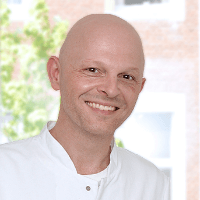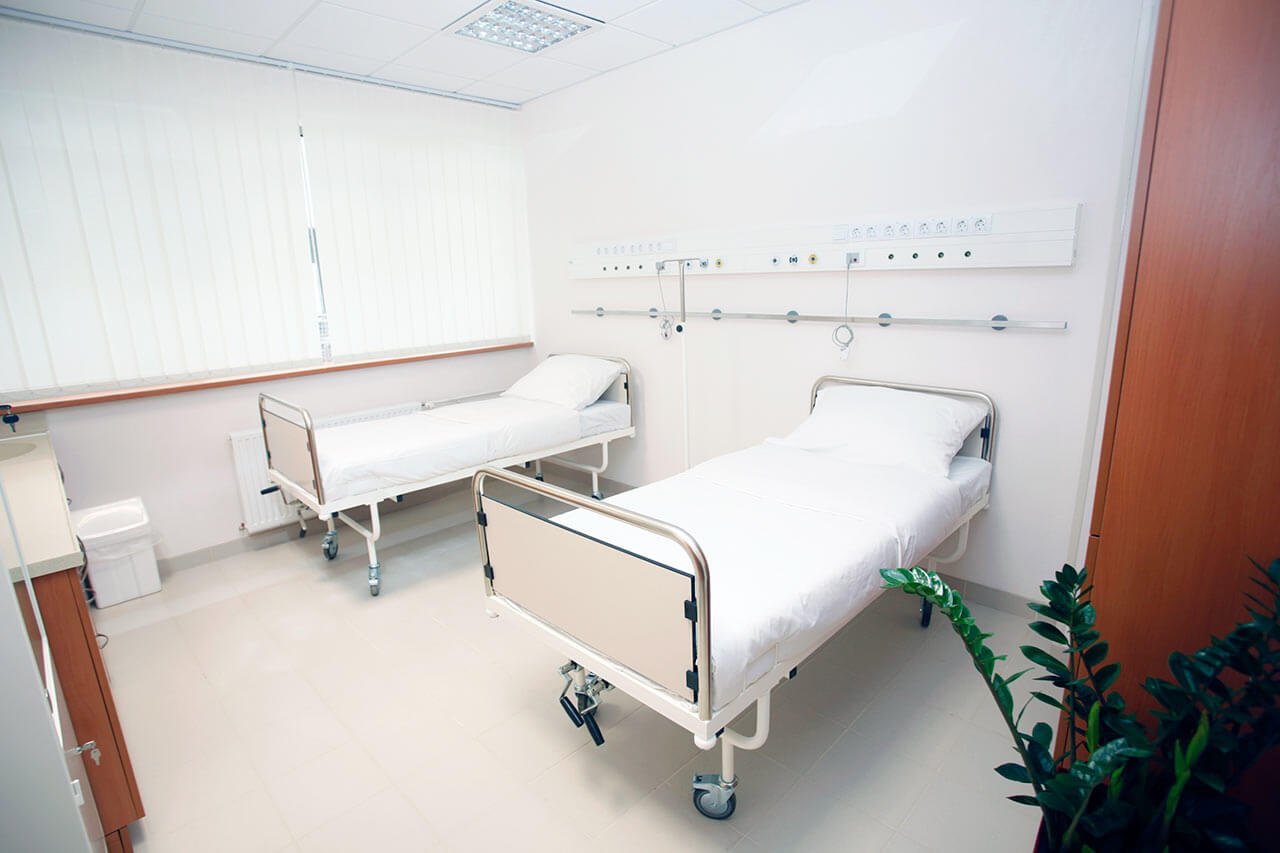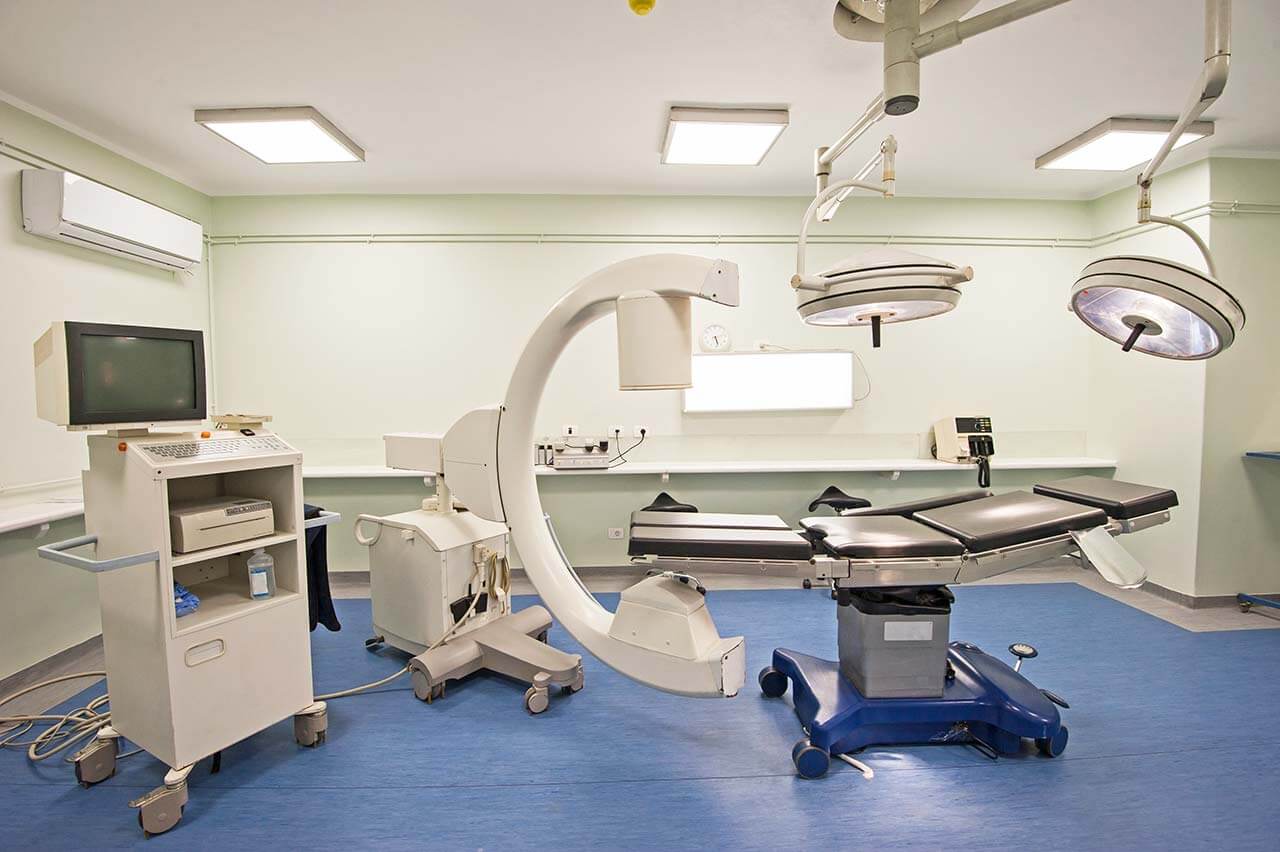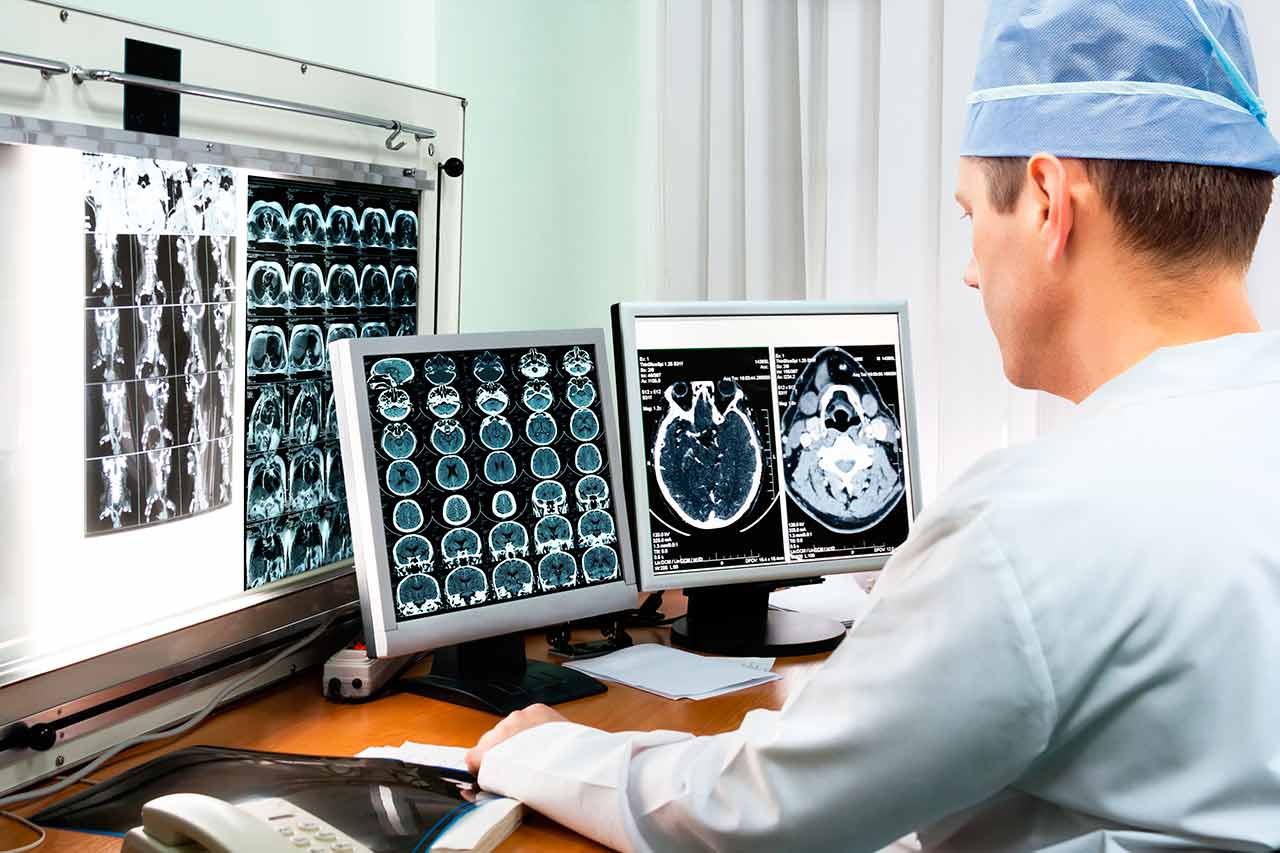
The program includes:
- Initial presentation in the clinic
- clinical history taking
- general clinical examination
- laboratory tests:
- complete blood count
- general urine analysis
- biochemical analysis of blood
- TSH-basal, fT3, fT4
- tumor markers
- thyroid autoantibodies
- indicators of inflammation
- indicators of blood coagulation
- thyroid ultrasound
- CT scan of the thyroid gland (on indication 650 €)
- MRI scan of the thyroid gland (on indication 1200 €)
- thyroid scintigraphy
- biopsy of the thyroid tumor with histological examination (on indication 2000 €)
- nursing services
- consultation of related specialists
- consultation of the chief physician and all leading experts
- development of individual treatment plan
- written statement
Required documents
- Medical records
- MRI/CT scan (not older than 3 months)
- Biopsy results (if available)
Service
You may also book:
 BookingHealth Price from:
BookingHealth Price from:
About the department
According to the Focus magazine, the Department of General, Abdominal and Transplant Surgery at the University Hospital Muenster is ranked among the top German medical facilities specializing in bowel cancer treatment!
The department offers the full range of services in these medical fields. The main clinical focuses include the surgical treatment of abdominal oncopathology, robotic surgery, minimally invasive surgery, endoscopy, organ transplantation and intensive care after surgical treatment. The department's doctors have special competence in the treatment of intestinal, pancreatic, stomach and liver cancers (certification of the German Cancer Society). The department is headed by Prof. Dr. med. Andreas Pascher.
The department is a recognized Center of Excellence in pancreatic surgery. For many years, the department's surgeons have performed a large number of operations on the pancreas (the special focus is on the surgical treatment of pancreatic cancer) with high success rates. The treatment is based on an interdisciplinary collaboration. The department's specialists also offer the advanced experience in the treatment of chronic inflammatory bowel diseases, particularly Crohn's disease and ulcerative colitis. The surgical therapy is used in the treatment of acute or chronic complications.
Another department’s key focus is small bowel and rectal surgery. The department's doctors perform more than 200 operations on these organs annually. The most common pathologies include diverticulitis, benign intestinal polyps and colon cancer. In addition, the department’s tasks include the treatment of liver diseases, especially liver cancer and liver metastases. In the treatment of peritoneal cancer, the innovative HIPEC treatment technique is widely used, which combines a surgical removal of the peritoneum (peritonectomy, cytoreductive surgery) with washing the abdominal cavity with a heated solution of chemotherapeutic drugs (hyperthermic intraperitoneal chemotherapy (HIPEC)). As a combination of the surgical intervention and drug therapy, this unique technique is available only in a few specialized surgery centers in Germany. The therapy gives excellent results and often saves patients' lives even in the most complex clinical cases.
It should be noted that the department is one of the largest German transplantation centers, which performs all modern types of abdominal transplantations (liver, pancreas, kidney and small intestine). At the moment, the department's surgeons have performed more than 2,500 kidney transplantations, 300 liver transplantations, 50 pancreatic transplantations and 4 small intestine transplantations.
The major purpose of the department’s medical team is to provide patients with the most effective and at the same time sparing treatment, if possible using minimally invasive techniques. The department also has excellent technical equipment in order to carry out robotic surgery, which today is a breakthrough in modern medicine.
The service range of the department includes:
- Diagnostics and treatment of pancreatic diseases
- Pancreatic cancer
- Pancreatic neuroendocrine tumors
- Cystic tumors of the pancreas (for example, intraductal papillary mucinous neoplasm)
- Pancreatic pseudocysts
- Chronic and acute pancreatitis
- Endocrine pancreatic insufficiency (diabetes mellitus)
- Pancreatic malformations
- Traumatic pancreatic injuries
- Benign tumors (adenomas) of the major duodenal papilla
- Cancer of the major duodenal papilla
- Diagnostics
- Multidetector spiral computed tomography
- Combined PET-CT technique
- Magnetic resonance cholangiopancreatography
- Endoscopic retrograde cholangiopancreatography
- Endoscopic ultrasound examinations
- Endoscopic needle biopsy
- Therapy
- Pancreatic head resection according to Traverso-Longmire
- Pancreatic head resection according to Kausch-Whipple
- Left-sided pancreatic resection
- Pancreatotomy
- Duodenum-preserving pancreatic head resection according to Frey or Beger
- Pancreatic drainage surgery (Partington-Rochelle technique)
- Diagnostics
- Diagnostics and treatment of pelvic floor and fecal incontinence
- Internal rectal prolapse and rectocele
- Slow transit constipation
- Bowel obstruction
- External rectal prolapse
- Fecal incontinence
- Diagnostics
- Endoscopy
- Manometry
- 3D endosonography
- Defecography
- Therapy
- Stimulation of the pelvic floor sacral nerves
- Sphincter reconstruction
- Stapled transanal rectal resection (STARR)
- Laparoscopic ventral rectopexy
- Laparoscopic resection rectopexy
- Rectal resection (Altemeier procedure)
- Laparoscopic colectomy with ileorectostomy
- Diagnostics
- Diagnostics and treatment of chronic inflammatory bowel diseases (Crohn's disease, ulcerative colitis)
- Strictureplasty in stenoses
- Minimally invasive techniques
- J-Pouch procedure
- Diagnostics and treatment of diseases of the small and large intestine, rectum
- Diverticulitis
- Benign bowel polyps
- Colon cancer
- Diagnostics and treatment of anal and rectal diseases (proctology)
- Rigid and flexible recto-/sigmoidoscopy
- Transrectal endoscopic ultrasonography with 3D reconstruction
- Rectoscopy
- Proctoscopy in hemorrhoid or rectal tumors
- Sphincter manometry
- Conservative therapy of hemorrhoids (hardening and ligature)
- Surgical treatment of hemorrhoids, including Longo procedure
- Conservative and surgical treatment of anal fissures
- Surgical treatment of anal fistulas
- Transanal endoscopic microsurgery
- Sphincter reconstruction
- STARR operation
- Sacral nerve stimulation
- Exercises to strengthen the pelvic floor muscles, including Biofeedback technique
- Diagnostics and treatment of diseases of the endocrine organs (thyroid, parathyroid glands, adrenal glands)
- Diagnostics and treatment of diseases of the liver, gallbladder and bile ducts
- Minimally invasive surgery
- Installation of port systems in liver diseases
- Typical and atypical liver resections (also in liver cirrhosis)
- Two-stage resections
- Ablative treatment methods in liver diseases (radiofrequency laser-induced thermoablation, cryoablation)
- Diagnostics and treatment of esophageal and stomach diseases
- Gastroesophageal reflux disease
- Zenker's diverticulum
- Esophageal cancer
- Stomach cancer
- Gastritis
- Stomach ulcer
- Benign tumors of the esophagus and stomach
- Diagnostics and treatment of peritoneal cancer (one of the few medical facilities in Germany, which offers the innovative HIPEC therapy)
- Transplantation surgery
- Liver transplantation
- Kidney transplantation
- Pancreas transplantation
- Small bowel transplantation
- Robotic surgery
- Upper gastrointestinal surgery
- Operations on the esophagus and stomach (benign and malignant tumors)
- Bariatric surgery in morbid obesity
- Diaphragmatic surgery
- Diaphragmatic rupture
- Gastroesophageal reflux (heartburn)
- Surgery of the small and large intestine, rectum
- Removal of malignant tumors
- Diverticular disease treatment (inflammation of intestinal diverticula)
- Pancreatic and liver surgery
- Removal of malignant and benign tumors
- Spleen surgery (spleen removal)
- Upper gastrointestinal surgery
- Endoscopy
- Endoscopic diagnostics
- Esophagogastroduodenoscopy
- Endosonography of the esophagus, stomach, pancreas
- Examination of the biliary tract and pancreas (endoscopic retrograde cholangiopancreatography)
- Diagnostic and therapeutic colonoscopy
- Bronchoscopy (for example, in lung tumors or metastases)
- Endoscopic therapy
- Esophageal stent implantation
- Endoscopic stone removal
- Stent implantation in the pancreatic and bile ducts
- Endosonography-guided puncture
- Percutaneous endoscopic gastrostomy
- Installation of PEG probes for artificial nutrition
- Endoscopic diagnostics
- Special treatment methods
- Intraoperative radiation therapy
- Neuromonitoring in thyroid surgery
- Radiofrequency ablation
- Preoperative liver function monitoring
- Transarterial liver chemoembolization
- MARS therapy
- Functional neuromonitoring of the pelvic organs during bowel surgery
- Other diseases, diagnostic and therapeutic methods
Curriculum vitae
On 1 April 2018, Prof. Dr. med. Andreas Pascher was appointed as the Head of the Department of General, Abdominal and Transplant Surgery at the University Hospital Muenster. Prior to this, the doctor held the position of Deputy Head of the Department of Surgery at the University Hospital Charite, as well as the Medical Director of the Charité Campus Mitte. During his work at the Charité, the main areas of his specialization included oncological and reconstructive abdominal surgery. As of today, while holding the position at the University Hospital Muenster, Professor focused his activities on computerized surgery and sparing imaging-guided surgical techniques.
In 2017, Doctor received Von Langenbeck Prize for his outstanding scientific achievements in the field of small bowel and multivisceral transplantation. This prize is one of the most prestigious awards of the German Society of Surgery and it is awarded for special scientific achievements in surgery.
Photo of the doctor: (c) Universitätsklinikum Münster
About hospital
According to the Focus magazine, the University Hospital Muenster ranks among the top German hospitals!
The hospital belongs to the most prestigious medical institutions in Germany. The hospital is distinguished by a high professionalism of its doctors, state-of-the-art technological equipment and the availability of the most advanced diagnostic and therapeutic capabilities ensuring the first-class medical services. The hospital integrates more than 30 specialized departments, as well as numerous institutes and centers, thus representing all the specialties of modern medicine. The hospital treats more than 64,000 inpatients and 500,000 outpatients every year, which is an indisputable evidence of the highest quality of medical services.
The medical team of the hospital, consisting of more than 10,000 employers, is committed to preserving the physical health of patients, providing them with psychological support and compassionate attitude throughout the entire therapeutic process.
The hospital has succeeded in all specialties of medicine, however, main areas of its specialization include oncology, treatment of cardiovascular, neurological diseases, transplant medicine, psychiatry and psychosomatics, pediatrics with a special focus on rare diseases in children, traumatology, orthopedics, prenatal medicine, and reproductive medicine. In addition, key importance is given to scientific research and training of medical students, so that the specialists of the hospital make a momentous contribution to the development of medicine as a whole.
Photo: (с) depositphotos
Accommodation in hospital
Patients rooms
The patients of the University Hospital Muenster live in single or double rooms. The rooms are made in bright colors and modern design. Each room has an ensuite bathroom with shower and toilet. The standard room includes an automatically adjustable bed, a bedside table, a table and chairs for receiving visitors, a telephone and a TV. The hospital offers access to the Internet. If desired, the patient can also stay in the enhanced-comfort room.
Meals and Menus
The patients of the hospital are offered a tasty and balanced three meals a day: breakfast, lunch and dinner. The menu always features diet and vegetarian dishes. If for any reason you do not eat all the food, you will be provided with an individual menu. Please inform the medical staff about your dietary preferences prior to the treatment.
Further details
Standard rooms include:
Religion
Religious services are available upon request.
Accompanying person
During the inpatient program, an accompanying person may stay with you in a room or at the hotel of your choice.
Hotel
During the outpatient program, you can live at a hotel of your choice. Managers will help you to choose the most suitable options.
The hospital offers a full range of laboratory tests (general, hormonal, tests for infections, antibodies, tumor markers, etc.), genetic tests, various modifications of ultrasound scans, CT scans, MRI and PET / CT, angiography, myelography, biopsy and other examinations. Treatment with medications, endoscopic and robotic operations, stereotaxic interventions is carried out here, modern types of radiation therapy are also used. The hospital offers patients all the necessary therapeutic techniques.
- Stereotactic radiotherapy, including intracranial one
- Thulium and holmium laser enucleation of the prostate
- HIPEC for peritoneal cancer
- Imlantation of mechanical heart support systems
- Assisted reproductive technologies
These are arthrosis and sports injuries of the joints, benign neoplasms and malignant tumors of various localizations, spinal injuries, osteoporosis, benign prostatic hyperplasia, urolithiasis, inflammatory bowel disease and other pathologies.
- Traumatology and hand surgery
- Urology
- General and abdominal surgery
- Cardiology and cardiac surgery
- Obstetrics and gynecology
The hospital's team consists of more than 10,000 highly qualified employees.






